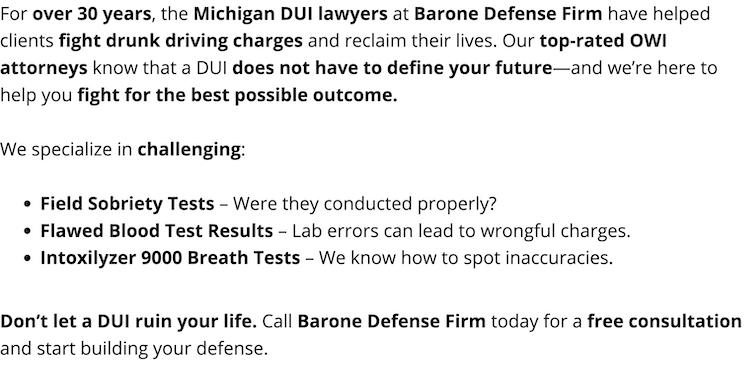Breath Test for Alcohol in Michigan
The legal limit in Michigan is .08. So, if your breath test result came back at .08 or above, you will be charged with drunk driving. Michigan calls this Operating While Intoxicated "OWI", which is a version of DUI. Both are acronyms simply mean drunk driving.
In Michigan, police officers employ a variety of methods to determine a driver's blood alcohol concentration (BAC) during a DUI arrest. One such method is the use of an infrared breath testing device, commonly known as a breathalyzer.
Breath tests in Michigan are considered less accurate than blood tests. Breath tests are more accurate than urine tests. All three BAC tests are intended to measure blood alcohol content.
How do Breath Tests Work?
Michigan currently has two different kinds of breathalyzers, the DataMaster DMT and the Intoxilyzer 9000. Both instruments utilize the science of infrared measurement.
Infrared breath testing works based on the principle that different substances absorb infrared light at specific wavelengths, allowing the device to measure the concentration of alcohol in a person's breath.
During a DUI arrest, the driver is typically asked to blow into a breathalyzer device. The breathalyzer contains an infrared light source that emits infrared light through a sample chamber. As the breath passes through the chamber, the alcohol molecules present in the breath absorb some of the infrared light at specific wavelengths. The device measures the amount of light absorbed and calculates the concentration of alcohol in the breath sample.
Infrared breath testing devices used in Michigan are designed to be accurate and reliable. This is not always true, however. It's important to note that the results obtained from a breathalyzer test are indirect measurements of blood alcohol concentration. This is one reason for the police must wait 15 minutes before collecting the breath sample.
Possible Defenses to an Alcohol Breath Test in Michigan
While both the DataMaster DMT and Intoxilyzer 9000 are generally considered to be effective, there are many factors that can potentially influence the accuracy of the results. For instance, if the breathalyzer is not properly calibrated or maintained, it could yield inaccurate readings.
Additionally, certain substances or medical conditions, such as mouthwash or certain medications, may affect the results. In any case, if you have been arrested for DUI in Michigan, it is crucial to consult with a qualified attorney who can review the specifics of your case and potentially challenge the breathalyzer results if necessary.
While the breath test is sure to be a key piece of the prosecution's evidence against you, this test is also a central point of attack for the defense team. There are many ways to beat an alcohol breath test at trial.
Also for a detailed explanation of possible breath test defenses specific to an Intoxilyzer 9000 breath test, see Patrick Barone and Mike Boyle's Article: The Intoxilyzer 9000 Michigan's New Breath Test Instrument.
What Happens if I Refuse the Breath Test for Alcohol in Michigan?
In Michigan, if a person is arrested for drunk driving and refuses to take a breath test, they can face certain legal consequences under what is known as the "implied consent" law. When a person obtains a driver's license in Michigan, they implicitly agree to submit to chemical tests, such as breath tests, if they are lawfully arrested for driving under the influence.
If a driver refuses to take a breath test after being arrested for drunk driving, their driver's license may be subject to an automatic suspension. This is known as an implied consent suspension. This law applies only to the breath test administered at the police station. It does not apply to the roadside test by a law enforcement officer.
The length of the suspension depends on several factors, including prior drunk driving convictions. For a first-time refusal, the license suspension can be up to one year. Subsequent refusals can result in longer suspensions and increased penalties.
If you have been arrested for drunk driving in Michigan and have refused a breath test, it is crucial to seek legal counsel from an experienced DUI defense attorney and criminal defense law firm.
Difference Between Roadside Breath Test and Second Test at Police Station
In a drunk driving case, there are typically two types of breath tests that may be administered: a roadside preliminary breath test (PBT) and a breath test conducted at the police station.
A roadside preliminary breath test is usually administered by a law enforcement officer at the scene of a traffic stop or during a field sobriety test. It is used as a quick and initial screening tool to determine if there is probable cause to make an arrest for drunk driving.
The PBT is typically a portable handheld device that measures a person's breath alcohol concentration (BAC). While the results of a PBT may be considered by the officer during the decision-making process, they generally cannot be used as direct evidence in court to prove intoxication. In some jurisdictions, a driver may have the right to refuse a roadside PBT, although there may be legal consequences for refusing.
On the other hand, a breath test conducted at the police station, often referred to as an evidentiary breath test or a chemical test, is a more comprehensive and accurate procedure. It is typically performed using a larger and more sophisticated breathalyzer machine that is properly calibrated and maintained.
This test is conducted after a person has been arrested for suspected drunk driving and is taken to the police station. The results of the breath test at the police station can be used as evidence in court to establish a person's BAC and potential impairment level.
It's important to note that the laws and procedures surrounding roadside preliminary breath tests and breath tests at the police station can vary depending on the jurisdiction. If you are facing a drunk driving charge, it is advisable to consult with a qualified DUI defense attorney who can provide guidance based on the specific laws and regulations in your area.
There Is Another Way to Prove DUI
It's important to note that even if a person refuses the breath test, the prosecution can still pursue charges for drunk driving based on other evidence, such as observations made by the arresting officer, field sobriety tests, or witness statements. For a detailed explanation of the two theories that the prosecutor can use to show that you were DUI, see: In Michigan OWI Can be Proved by Showing OUIL or UBAL.
The Michigan DUI defense lawyers at the Barone Defense Firm will give you a free consultation and will guide you through the legal process, assess the specific circumstances of your case, and help you understand and protect your rights.
 Barone Defense Firm Home
Barone Defense Firm Home
















